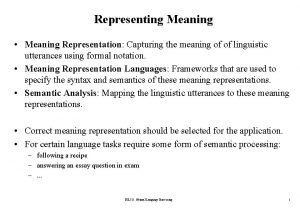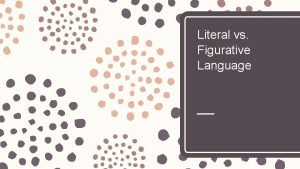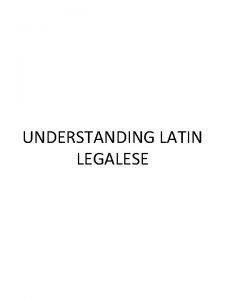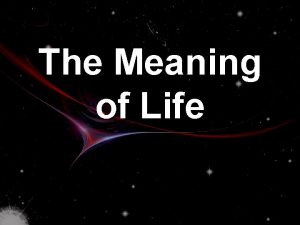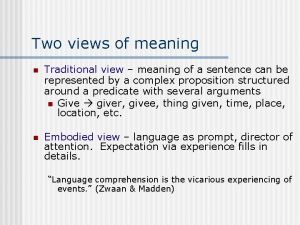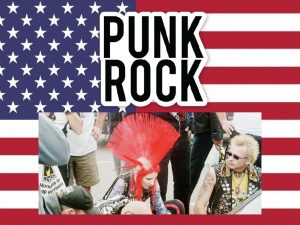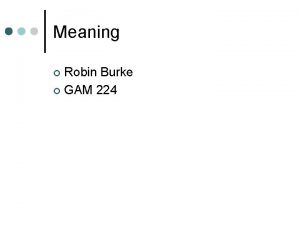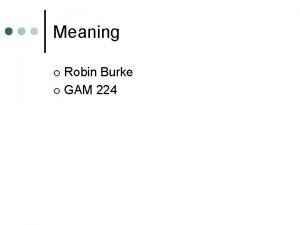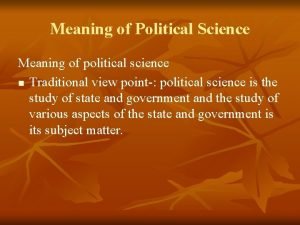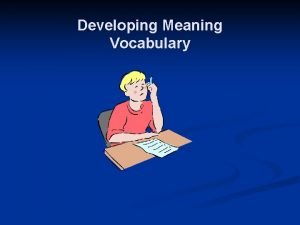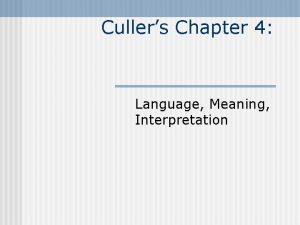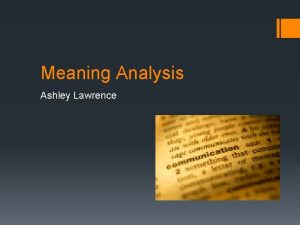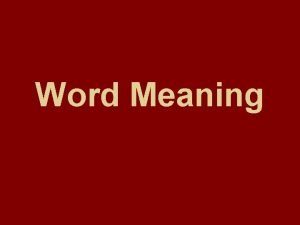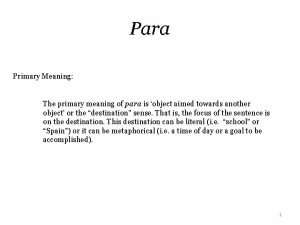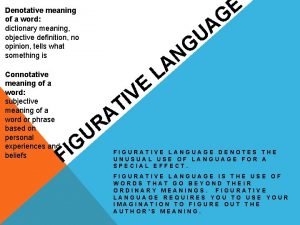THE GOVERNMENT MEANING OF GOVERNMENT A government is



















- Slides: 19

THE GOVERNMENT

MEANING OF GOVERNMENT A government is a group of people who govern the citizens of a country, they are responsible for running the country and making policies and passing laws • The Government of South Africa are elected democratically Democracy: When all the people in a country can vote for their government presentation

LEVELS OF GOVERNMENT NATIONAL GOVERNMENT PROVINCIAL GOVERNMENT LOCAL GOVERNMENT

NATIONAL GOVERNMENT • Operate in the Top level • Make sure the State runs efficiently • Makes up laws that affect the whole country • Make citizens obey the State Laws • President is the Head of State • Current President is Cyril Ramaphosa • The president appoint deputy ministers • Ministers form the cabinet

Two houses of NATIONAL GOVERNMENT NATIONAL ASSEMBLY (FUNCTIONS OT THE STATE) Divided into three branches: • Legislative (Cabinet) • Executive (Parliament) • Judicial (Supreme Court) NATIONAL COUNCIL OF PROVINCES (LEVELS OF THE STATE) • They make the Governments job easier • Appoint a Provincial Government for every province • Appoint the Premier of every Province • Provincial Governments must report back to the NCOP

National assembly: function 1: Cabinet/legislative • It makes the laws and policies of the country • It consists of the South African Parliament • President is the head • Day to day activities to run the country

National assembly: function 2: executive/Parliament • It has the power to execute or carry out laws • It leads the country and consists of the President, Deputy President and Ministers • Meetings take place in Cape Town. • Consists out of 2 houses: • National Assembly (NA) • National Council of Provinces (NCOP)

National assembly: function 3: Judiciary/laws • It ensures that justice is served if people break the laws that Parliament makes • Made up of four tiers of courts • Magistrates Court – minor crimes • High Court – civil and criminal crimes • Supreme court of Appeal – final court of appeal not involving the constitution • Constitutional Court – final court of appeal involving the constitution

Level 1: NATIONAL GOVERNMENT • Provide for a stable set of institutions and rules • Make and control laws • Protection: defence, police and correctional services • Education: Basic and higher Education and training • Administrative: control of Economic activities, foreign affairs and judicial • Economic: improvement of agriculture, mining, trade, industries and transport services • National Budget by the Minister of Finance

LEVEL 1: PROVINCIAL GOVERNMENT: • The second level of management • 9 Provincial Governments • Elected every 5 years • Head of each province is called a Premier. • Appointed by the president • Followed by MECs • Each member must manage a department MECs: Members of the Executive Council. Are in charge of certain portfolios

PROVINCIAL GOVERNMENT services • Health services and welfare (Hospitals and Clinics) • Conservation of nature and the environment (protection of coastal resources and environmental education) • Administrative services ( payment of pensions and other social grants) • Providing a cultural infrastructure (subsidizing theatres, art galleries and performing arts • Construction and maintenance of provincial roads • Building of schools, provision of educators, textbooks and stationary

Level 3: LOCAL GOVERNMENT • • • Consists of over 280 municipalities Provide a democratic and accountable government for local communities Ensure that services are provided to communities Promote social and economic development Responsible for local: roads traffic clinics libraries sewage water & electricity transport

LOCAL GOVERNMENT: Municipalities Metropolitans District Local • Called unicities or metros • Run the local affairs of SA’s largest cities • Runs affairs of areas where the population in scattered • Runs affairs of smaller towns

The 8 Metros: • Buffalo City (East London) • City of Cape Town • Ekurhuleni (East Rand) • City of e. Thekwini (Durban) • City of Johannesburg • Mangaung (Bloemfontein) • Nelson Mandela (Port Elizabeth) • City of Tshwane (Pretoria)

Government income: • Income tax • Levies (eg VAT) • Duties (eg Customs duties)

Government interact with this two roleplayers: HOUSEHOLDS • Means all the people living together in a house. • Households own the factors of production • Provide services • Households pay taxes. BUSINESS • All levels of government are consumers. • They are also producers • Businesses are consumers because they pay for certain services. • They also pay tax to the government

Households use services and provide resources : Services: • Education • Hospitals • Sport and recreation facilities • Help people with Disabilities • Safety • Water and sanitation • Electricity Resources: • Workers, buildings, medicine • Infrastructure • Social grants • Police, military and correctional services • Infrastructure, workers, land • Infrastructure , workers, machinery

The role the government plays regards to Businesses Services • Provide electricity, water • and waste removal • Promotes tourism • Encourages business development • Promotes international trade Resources • Ensure good roads • Promotes tourists to visit • Getting involved in farming, forestry and fishing • Encourage production of goods and services

Laws to protect the rights of workers Basic Conditions of Employment Act • This law sets minimum employment standards for employers and employees Labour Relations Act Employment Equity Qct • This law protects workers or people looking for employment against unfair labour practices and allows workers to join trade unions • This law protects workers against unfair discrimination and ensures that businesses employ a workforce that is representative of the population
 Hát kết hợp bộ gõ cơ thể
Hát kết hợp bộ gõ cơ thể Lp html
Lp html Bổ thể
Bổ thể Tỉ lệ cơ thể trẻ em
Tỉ lệ cơ thể trẻ em Voi kéo gỗ như thế nào
Voi kéo gỗ như thế nào Tư thế worm breton
Tư thế worm breton Chúa sống lại
Chúa sống lại Các môn thể thao bắt đầu bằng tiếng chạy
Các môn thể thao bắt đầu bằng tiếng chạy Thế nào là hệ số cao nhất
Thế nào là hệ số cao nhất Các châu lục và đại dương trên thế giới
Các châu lục và đại dương trên thế giới Công thức tính độ biến thiên đông lượng
Công thức tính độ biến thiên đông lượng Trời xanh đây là của chúng ta thể thơ
Trời xanh đây là của chúng ta thể thơ Cách giải mật thư tọa độ
Cách giải mật thư tọa độ 101012 bằng
101012 bằng độ dài liên kết
độ dài liên kết Các châu lục và đại dương trên thế giới
Các châu lục và đại dương trên thế giới Thơ thất ngôn tứ tuyệt đường luật
Thơ thất ngôn tứ tuyệt đường luật Quá trình desamine hóa có thể tạo ra
Quá trình desamine hóa có thể tạo ra Một số thể thơ truyền thống
Một số thể thơ truyền thống Cái miệng nó xinh thế
Cái miệng nó xinh thế




















